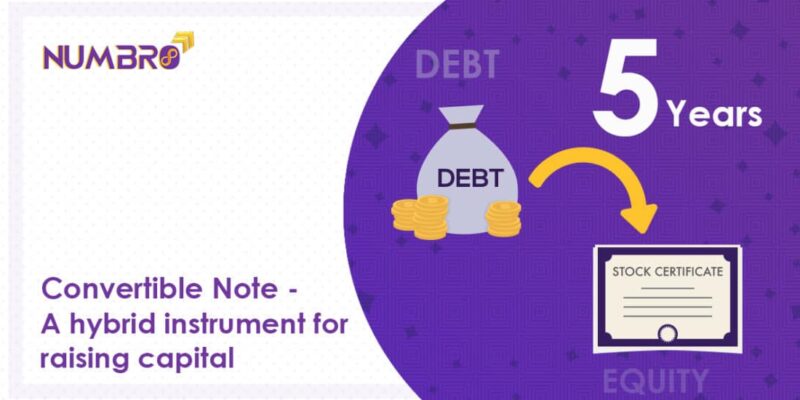Convertible Note – A hybrid instrument for raising capital
convertible note is an optionally convertible instrument that gives and investor the option (on maturity i.e. when the company raises next round of funding) to convert their debt into equity at a pre-determined discount on the amount paid by the investor in the next round of funding.
Foreign direct investment gives an option to infuse capital into business and ECB gives an option to receive debt from a non -resident. Convertible Note gives an option to access to a hybrid instrument which gives the investor to use the option of Equity and debt in the same instrument.
If the company’s valuation does not increase as per the expectations of the investors, they can choose not to convert and instead redeem the note at an interest rate subject to the terms & conditions contained therein. This reduces the risk for the investor, while at the same time allows the possibility of conversion into equity if the company performs well.
What is Convertible Note
Convertible Note’ means an instrument issued by a startup company evidencing receipt of money initially as debt, which is repayable at the option of the holder, or which is convertible into such number of equity shares of such startup company, within a period not exceeding five years from the date of issue of the convertible note, upon occurrence of specified events as per the other terms and conditions agreed to and indicated in the instrument.
Features
- A Convertible Note is typically set up like a debt instrument, which carries interest and has maturity to it, along with a discount on the next significant round of investment that values the start-up.
- It is initially a debt instrument that may at the option of the note holder, either be repaid or converted into equity within five years from issuance.
- If the Convertible Note hasn’t converted by the maturity date, it instead becomes equity in the start-up, which would require setting a valuation for this potential conversion today.
- Pricing guidelines need not be complied with at the time of issuance of a convertible note unlike equity shares or CCPS.

Issuance of convertible Note
- The Government of India’s Ministry of Commerce and Industry has permitted “recognized start-ups” to raise funding through this route. A company that has received a Certificate recognizing company as a part of the government’s start-up India Action Plan will be able to issue a Convertible Note.
Start-up
- A private company incorporated under Indian company law within the last Seven years since Incorporation;
- Having an annual turnover not exceeding INR 250 million (US$3.8 million) in the past;
- Working towards innovation, development, deployment and commercialisation of new products, processes or services driven by technology or intellectual property; and
- Has been recognized/registered with the Department of Industrial Policy and Promotion.
Conditions applicable
- The minimum investment in a single tranche will have to be at least INR 25 lakhs (~ US$ 40,000)
- The amount will have to be converted within 5 years
- The terms of conversion will have to be determined upfront
Government approval
Prior government approval for the issuance of a convertible note will be required only for cases where the start-up is engaged in any activity that falls under the approval route under the existing regulatory framework for FDI. Start-ups engaged in sectors falling in the automatic route for FDI do not require any prior approval with respect to such issuance.

* vulputate eu scelerisque sit amet just

* vulputate eu scelerisque sit amet just
Advantages
- No need to have a valuation for issuing Convertible Note, which makes the process for issuance significantly faster.
- Less restrictions on the types of lenders compared to ECB
- Free transferability between resident and non-resident investors
- Investor has a right to choose between debt and equity form of the instrument based on the performance of the investee company




